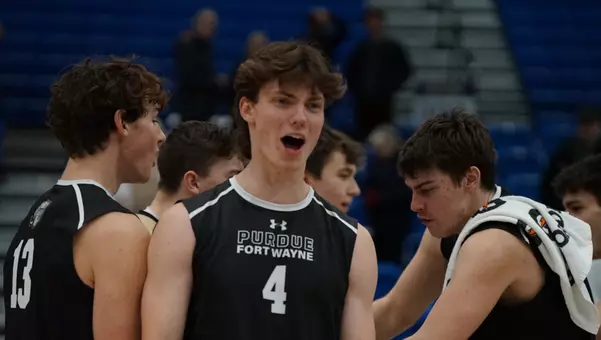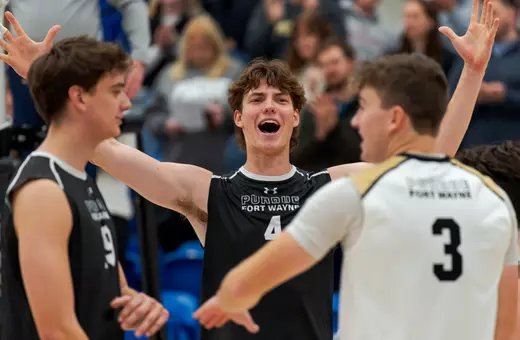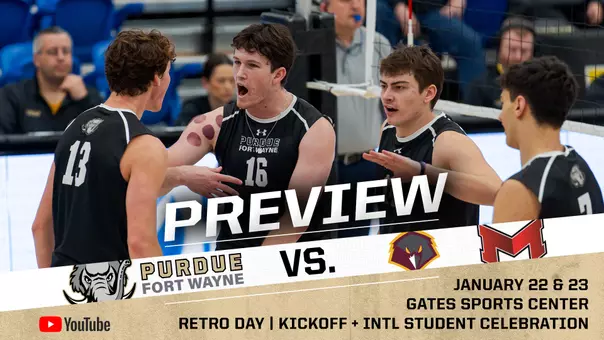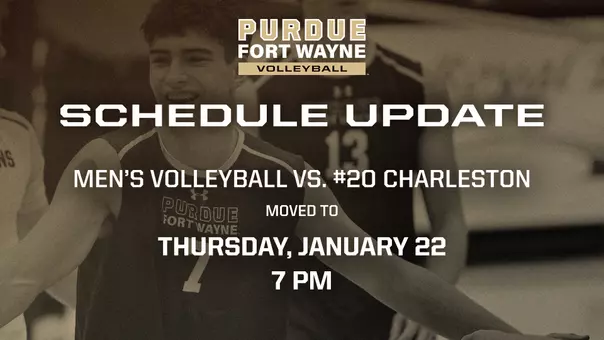
Pelegrin Vargas Jr. (left) and Pelegrin Vargas Sr. (right)
Pelegrin Vargas is Finding His Own Volleyball Path
9/15/2020 12:47:00 PM | Men's Volleyball
FORT WAYNE, Ind. - To many in the Summit City, Pelegrin Vargas is the name of an All-American men's volleyball player at Purdue Fort Wayne. But back home in Puerto Rico, Vargas' father of the same name may be what comes to mind first.
Vargas Sr. grew up in the country in Puerto Rico, near San Sebastián. His volleyball career dates back to when a recreative leader, a person in Puerto Rico responsible for youth involvement in sports, recruited him from his home. He describes his younger self as a "fragile, long, and uncoordinated kid that wasn't very talented." The age gap between Vargas Sr. and his younger sister hindered them from just playing with each other, so he started playing and learning the game of volleyball. Once he started to grow into his body and training, he started to become a competent volleyball player.
Before meeting his future wife, Vargas Sr. played collegiate volleyball at the University of Puerto Rico Mayagüez and on a team akin to the minor leagues simultaneously. After this stint, he played for the Puerto Rican Men's National Team for 13 years. The majority of this stretch came after breaking two vertebrae. Despite this, Vargas Sr. continued to play for San Sebastián and Puerto Rico, which resulted in respect coming from his fans who appreciated his loyalty.
"He's always remembered in the towns that he played in as an iconic player," Vargas Jr. said. "People remember him with high regards and a lot of love because he brought them back a ton of wins. He always had a good relationship with people and he's a very charismatic guy. People always remind me of how great he was as a person and a player."
Vargas Sr. retired in 1993, got married in 1995, then came out of retirement for one year in 1998. This was when his wife Ana was pregnant with their first child, who would eventually be given his father's name. In his final year of volleyball, he played in Lares because San Sebastián was not interested in a 35-year-old player who had been away from the competitive scene for five years. His coach at Lares decided to have him start against his former team, and his play was good enough to be the high note that he wanted to end on. This was the end of Vargas Sr.'s competitive volleyball journey. His son, on the other hand, had yet to even begin telling his story.
Vargas Jr. was born on July 31, 1998, after his father had retired for the second time, so he never got to see his father play in person. But he recalls watching videos and was impressed.
"He was impressive because he was good, and there weren't very many tall guys to stop him," Vargas Jr. said. "He set, he played middle, he played outside, and he played outside. He was just so versatile."
As the younger Vargas was growing up, the two would attend professional volleyball matches, but until age nine, it was all about watching. One day, Vargas Jr. looks to his father and said "Dad, I want to be just like you."
His father responded by saying: "I've already written my book, it's time for you to write yours."
When he was young and watching more experienced volleyball athletes play, the goal in Vargas Jr.'s mind was simple and unilateral: become a member of the Puerto Rican Men's National Team, like his father. To help himself understand what it takes to get to play at that level, he started researching the players he would see on the court, and investigate their path to the professional ranks.
Vargas Jr. began to notice a trend with the best of the best in Puerto Rican history. Many attended schools in the continental United States to compete in the NCAA. Angel Perez, Victor Rivera, Jose Rivera, Hector Soto and Raul Papaleo all played collegiate volleyball and were on one of the most successful Puerto Rican teams of all time. Both of his parents went to college, and he was seeing the history of professional athletes come out of the collegiate ranks, so the decision to play in the NCAA was an easy one for Vargas Jr. Once he decided that this was the path he wanted to take, he had to begin the recruiting process.
"I was super lucky," Vargas Jr.said. "I don't think I'm that impressive of a player, and as a high school player I was even less impressive. I just think of myself as more of a mental guy and try to do things simple and be a good teammate."
Vargas Jr. was not highly recruited coming out of Colegio San José, but he had some connections that helped move the process along. He emailed virtually all Division I schools and many Division III schools in the country, but forgot one at the DI level. It just happened to be the one school that was recruiting him the hardest: a school then known as IPFW.
"I was thinking to myself, what is IPFW?" Vargas Jr. said. "But then I remembered, oh, that's where [Hector] Soto went. And Ramon Burgos. And Eddie Rivera. And Omar [Rivera]. And Luis [Bertran]. So something must be happening right there because there's been a lot of Puerto Ricans there. If they can do it, why can't I?"
While he was with the Puerto Rican Youth National Team, he played in a tournament with Ivan Matos, who had just finished a season coaching with the Mastodons. He passed along Vargas Jr.'s contact information to the coaching staff, and that was the beginning of his path to Purdue Fort Wayne.
Once he finalized the details with the Mastodons, he felt the sense of responsibility that weighed on him to make his family, his team, and his country proud. But he still had one goal in the forefront of his mind: become a member of the Puerto Rican Men's National Team.
It only took Vargas Sr. two weeks into his son's career to make it to Indiana to watch him play. It came as a surprise for the freshman, who was gearing up to play No. 14 Penn State. He got a pat on the back as starting lineups were being announced, and he looked back to see his dad there to watch. Vargas Jr. admits that he may have been overdoing it a bit.
It was just a few months after the match against Penn State that Vargas Jr. got a call to make his dream come true. He had just finished his freshman season, in which he led the team in kills per set, but had to sit on the sidelines for the last eight matches due to an injury. Despite this, he was invited to practice with the Puerto Rican Men's National Team.
"I just wanted to practice and see the guys that I grew up watching," Vargas Jr. said. "But actually sharing the court with them was amazing and hearing them talk to me like I'm just one more of them was incredible."
When he received his invitation to the Pan-American Games that summer, Vargas Jr. called his father to tell him the good news.
His father replied: "Is that guy crazy?"
Vargas Jr. went on: "I don't know if he's crazy but I'm going!"
The younger Vargas got to experience something that his father never got to, as the Puerto Rican Men's National Team never qualified for the Pan-American Games while Vargas Sr. was on the team.
Vargas Sr. has only been to Indiana to see his son play twice since the Penn State match in 2017. The first was a planned trip to see the Mastodons' matches against Loyola Chicago and Lewis in 2018, the season following his son's invitation to the National Team.
Vargas Jr. had 24 kills against No. 6 Loyola, which set a career-high at the time. It was not enough to give the Mastodons a win on that particular night, and Vargas took it personally.
"The team puts a lot of trust in me," Vargas Jr. said. "There was a sense of responsibility in me that I can't disappoint them. I don't like disappointing people that trust in me."
In 2019, Vargas Sr. returned to see his son's Top-15 caliber team play CSUN, a five-setter in which his son had 23 kills. Again, he saw a loss. In 2020, he was planning to come on Senior Night and hope for that win he has been itching to see in person, but since the season was cut short due to COVID-19, he has to wait a little longer.
After a few months of consideration following his shortened senior season, Vargas Jr. decided to return to Arnie Ball Court again in 2021, taking advantage of the extra year of eligibility granted by the NCAA. Since he has met the goals surrounding the National Team, his eyes have shifted solely toward a MIVA championship and a trip to the NCAA tournament.
"I'm still trying to write my own metaphorical book, while still giving credit to the original author that inspired me," Vargas Jr. said. "My dad has taught me a lot of things that he probably doesn't even know he's taught me. Not necessarily the skills, but mostly the things that come from playing volleyball: the education, the friendships, the memories, the experiences. Him teaching me those things has been something I treasure a lot."
In his three most recent seasons, Vargas Jr. has been named an AVCA All-America Honorable Mention. Entering his fifth year at Purdue Fort Wayne, Vargas Jr. has 1,295 career kills, which is the fourth-most among active players in the country.
Vargas Sr. grew up in the country in Puerto Rico, near San Sebastián. His volleyball career dates back to when a recreative leader, a person in Puerto Rico responsible for youth involvement in sports, recruited him from his home. He describes his younger self as a "fragile, long, and uncoordinated kid that wasn't very talented." The age gap between Vargas Sr. and his younger sister hindered them from just playing with each other, so he started playing and learning the game of volleyball. Once he started to grow into his body and training, he started to become a competent volleyball player.
Before meeting his future wife, Vargas Sr. played collegiate volleyball at the University of Puerto Rico Mayagüez and on a team akin to the minor leagues simultaneously. After this stint, he played for the Puerto Rican Men's National Team for 13 years. The majority of this stretch came after breaking two vertebrae. Despite this, Vargas Sr. continued to play for San Sebastián and Puerto Rico, which resulted in respect coming from his fans who appreciated his loyalty.
"He's always remembered in the towns that he played in as an iconic player," Vargas Jr. said. "People remember him with high regards and a lot of love because he brought them back a ton of wins. He always had a good relationship with people and he's a very charismatic guy. People always remind me of how great he was as a person and a player."
Vargas Sr. retired in 1993, got married in 1995, then came out of retirement for one year in 1998. This was when his wife Ana was pregnant with their first child, who would eventually be given his father's name. In his final year of volleyball, he played in Lares because San Sebastián was not interested in a 35-year-old player who had been away from the competitive scene for five years. His coach at Lares decided to have him start against his former team, and his play was good enough to be the high note that he wanted to end on. This was the end of Vargas Sr.'s competitive volleyball journey. His son, on the other hand, had yet to even begin telling his story.
Vargas Jr. was born on July 31, 1998, after his father had retired for the second time, so he never got to see his father play in person. But he recalls watching videos and was impressed.
"He was impressive because he was good, and there weren't very many tall guys to stop him," Vargas Jr. said. "He set, he played middle, he played outside, and he played outside. He was just so versatile."
As the younger Vargas was growing up, the two would attend professional volleyball matches, but until age nine, it was all about watching. One day, Vargas Jr. looks to his father and said "Dad, I want to be just like you."
His father responded by saying: "I've already written my book, it's time for you to write yours."
When he was young and watching more experienced volleyball athletes play, the goal in Vargas Jr.'s mind was simple and unilateral: become a member of the Puerto Rican Men's National Team, like his father. To help himself understand what it takes to get to play at that level, he started researching the players he would see on the court, and investigate their path to the professional ranks.
Vargas Jr. began to notice a trend with the best of the best in Puerto Rican history. Many attended schools in the continental United States to compete in the NCAA. Angel Perez, Victor Rivera, Jose Rivera, Hector Soto and Raul Papaleo all played collegiate volleyball and were on one of the most successful Puerto Rican teams of all time. Both of his parents went to college, and he was seeing the history of professional athletes come out of the collegiate ranks, so the decision to play in the NCAA was an easy one for Vargas Jr. Once he decided that this was the path he wanted to take, he had to begin the recruiting process.
"I was super lucky," Vargas Jr.said. "I don't think I'm that impressive of a player, and as a high school player I was even less impressive. I just think of myself as more of a mental guy and try to do things simple and be a good teammate."
Vargas Jr. was not highly recruited coming out of Colegio San José, but he had some connections that helped move the process along. He emailed virtually all Division I schools and many Division III schools in the country, but forgot one at the DI level. It just happened to be the one school that was recruiting him the hardest: a school then known as IPFW.
"I was thinking to myself, what is IPFW?" Vargas Jr. said. "But then I remembered, oh, that's where [Hector] Soto went. And Ramon Burgos. And Eddie Rivera. And Omar [Rivera]. And Luis [Bertran]. So something must be happening right there because there's been a lot of Puerto Ricans there. If they can do it, why can't I?"
While he was with the Puerto Rican Youth National Team, he played in a tournament with Ivan Matos, who had just finished a season coaching with the Mastodons. He passed along Vargas Jr.'s contact information to the coaching staff, and that was the beginning of his path to Purdue Fort Wayne.
Once he finalized the details with the Mastodons, he felt the sense of responsibility that weighed on him to make his family, his team, and his country proud. But he still had one goal in the forefront of his mind: become a member of the Puerto Rican Men's National Team.
It only took Vargas Sr. two weeks into his son's career to make it to Indiana to watch him play. It came as a surprise for the freshman, who was gearing up to play No. 14 Penn State. He got a pat on the back as starting lineups were being announced, and he looked back to see his dad there to watch. Vargas Jr. admits that he may have been overdoing it a bit.
It was just a few months after the match against Penn State that Vargas Jr. got a call to make his dream come true. He had just finished his freshman season, in which he led the team in kills per set, but had to sit on the sidelines for the last eight matches due to an injury. Despite this, he was invited to practice with the Puerto Rican Men's National Team.
"I just wanted to practice and see the guys that I grew up watching," Vargas Jr. said. "But actually sharing the court with them was amazing and hearing them talk to me like I'm just one more of them was incredible."
When he received his invitation to the Pan-American Games that summer, Vargas Jr. called his father to tell him the good news.
His father replied: "Is that guy crazy?"
Vargas Jr. went on: "I don't know if he's crazy but I'm going!"
The younger Vargas got to experience something that his father never got to, as the Puerto Rican Men's National Team never qualified for the Pan-American Games while Vargas Sr. was on the team.
* * *
Vargas Sr. has only been to Indiana to see his son play twice since the Penn State match in 2017. The first was a planned trip to see the Mastodons' matches against Loyola Chicago and Lewis in 2018, the season following his son's invitation to the National Team.
Vargas Jr. had 24 kills against No. 6 Loyola, which set a career-high at the time. It was not enough to give the Mastodons a win on that particular night, and Vargas took it personally.
"The team puts a lot of trust in me," Vargas Jr. said. "There was a sense of responsibility in me that I can't disappoint them. I don't like disappointing people that trust in me."
In 2019, Vargas Sr. returned to see his son's Top-15 caliber team play CSUN, a five-setter in which his son had 23 kills. Again, he saw a loss. In 2020, he was planning to come on Senior Night and hope for that win he has been itching to see in person, but since the season was cut short due to COVID-19, he has to wait a little longer.
After a few months of consideration following his shortened senior season, Vargas Jr. decided to return to Arnie Ball Court again in 2021, taking advantage of the extra year of eligibility granted by the NCAA. Since he has met the goals surrounding the National Team, his eyes have shifted solely toward a MIVA championship and a trip to the NCAA tournament.
"I'm still trying to write my own metaphorical book, while still giving credit to the original author that inspired me," Vargas Jr. said. "My dad has taught me a lot of things that he probably doesn't even know he's taught me. Not necessarily the skills, but mostly the things that come from playing volleyball: the education, the friendships, the memories, the experiences. Him teaching me those things has been something I treasure a lot."
In his three most recent seasons, Vargas Jr. has been named an AVCA All-America Honorable Mention. Entering his fifth year at Purdue Fort Wayne, Vargas Jr. has 1,295 career kills, which is the fourth-most among active players in the country.
~ Feel the Rumble ~
Players Mentioned
PFW vs Maryville (Men's Volleyball)
Friday, January 23
PFW vs University of Charleston (Men's Volleyball)
Thursday, January 22
PFW vs NJIT (Men's Volleyball)
Saturday, January 10
PFW vs Missouri S&T (Men's Volleyball)
Friday, January 09



.png&width=32&height=32&type=webp)

























